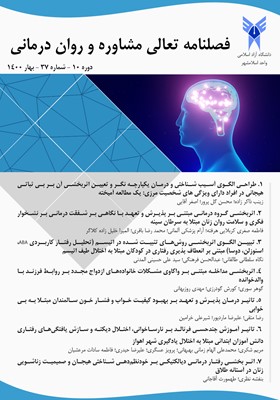اثر بخشی رفتار درمانی دیالکتیکی بر خودنظمدهی شناختی هیجان و صمیمیت زناشویی زنان در آستانه طلاق
محورهای موضوعی : فصلنامه تعالی مشاوره و روان درمانیبنفشه نظری 1 * , طهمورث آقاجانی 2
1 - کارشناس ارشد مشاوره و راهنمایی، گروه روانشناسی و مشاوره، واحد تهران غرب، دانشگاه آزاد اسلامی، تهران، ایران
2 - استادیار، گروه روانشناسی، واحد شهر قدس، دانشگاه آزاد اسلامی، تهران، ایران
کلید واژه: طلاق, صمیمیت زناشویی, رفتار درمانی دیالکتیکی, خودنظمدهی شناختی هیجان,
چکیده مقاله :
هدف: این پژوهش با هدف تعیین تاثیر رفتار درمانی دیالکتیکی بر خودنظمدهی شناختی هیجان و صمیمیت زناشویی زنان در آستانه طلاق انجام شد. روش: روش پژوهش از منظر هدف کاربردی و از منظر جمع آوری داده ها کمی بود. ااین مطالعه نیمهآزمایشی با طرح پیشآزمون و پسآزمون با گروه کنترل بود. جامعه پژوهش زنان در آستانه طلاق مراجعهکننده به مراکز مشاوره منطقه پنج شهر تهران در سال 1399 بودند که از میان آنها تعداد 40 نفر پس از بررسی ملاکهای ورود به مطالعه با روش نمونهگیری هدفمند انتخاب و با روش تصادفی به کمک قرعهکشی در دو گروه مساوی جایگزین شدند. گروه آزمایش 8 جلسه 90 دقیقهای تحت رفتار درمانی دیالکتیکی قرار گرفت و گروه کنترل آموزشی ندید. ابزارهای پژوهش فرم کوتاه پرسشنامه خودنظمدهی شناختی هیجان گارنفسکی و کرایج (2006) و پرسشنامه صمیمیت زناشویی والکر و تامپسون (1983) بودند. دادهها با روشهای مجذور کای، آزمون تی مستقل و تحلیل کوواریانس چندمتغیری در نرمافزار SPSS-19 تحلیل شدند. یافتهها: یافتهها نشان داد که گروههای آزمایش و کنترل از نظر سن، تحصیلات و نوع ازدواج تفاوت معناداری نداشتند (05/0<P). همچنین، گروهها در مرحله پیشآزمون از نظر خودنظمدهی شناختی هیجان و صمیمیت زناشویی تفاوت معناداری نداشتند (05/0<P)، اما در مرحله پسآزمون از نظر آنها تفاوت معناداری داشتند (05/0P<). به عبارت دیگر، رفتار درمانی دیالکتیکی باعث افزایش راهبردهای مثبت خودنظمدهی شناختی هیجان و صمیمیت زناشویی و کاهش راهبردهای منفی خودنظمدهی شناختی هیجان در زنان آستانه طلاق شد (001/0P<). نتیجهگیری: بر اساس نتایج پژوهش حاضر، درمانگران و مشاوران میتوانند از روش رفتار درمانی دیالکتیکی در کنار سایر روشهای درمانی برای بهبود ویژگیهای روانشناختی زنان در آستانه طلاق بهویژه بهبود خودنظمدهی شناختی هیجان و صمیمیت زناشویی آنان استفاده نمایند.
Purpose: This research was conducted with the aim of determine the effect of dialectical behavior therapy on cognitive emotion self-regulation and marital intimacy in women on the verge of divorce. Methodology: The research method was applied in terms of purpose and quantitative in terms of data collection. This study was semi-experimental with a pretest and posttest design with control group. The research population was women on the verge of divorce referring to the counseling centers of five region of Tehran city in 2020 year, who from them 40 people after reviewing the inclusion criteria were selected by purposive sampling method and with random method with lottery replaced into two equal groups. The experimental group 8 sessions of 90-minute underwent the dialectical behavior therapy and the control group did not see any training. The research tools were the Garnefski and Kraaij cognitive emotion self-regulation questionnaire of short version (2006) and Walker and Thompson marital intimacy questionnaire (1983). Data were analyzed with chi-square, independent t test and multivariate analysis of covariance methods in the SPSS-19 software. Findings: The findings showed that the experimental and control groups did not have significant different in terms of age, education and type of marriage (P>0.05). Also, groups in the pretest stage did not have significant different in terms of cognitive emotion self-regulation and marital intimacy (P>0.05), but in the posttest did have significant different in terms of them (P<0.05). In the other words, dialectical behavior therapy led to increase the positive strategies of cognitive emotion self-regulation and marital intimacy and decrease negative strategies of cognitive emotion self-regulation in women on the verge of divorce (P<0.001). Conclusion: Based on the results of present research, therapists and counselors can use from dialectical behavior therapy method along with other therapeutic method to improve psychological traits of women on the verge of divorce especially improve their cognitive emotion self-regulation and marital intimacy.
_||_

